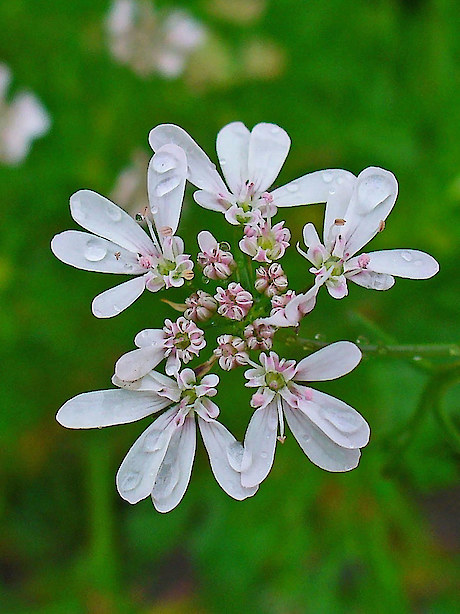Coriandrum sativum
Download info sheetThis delicate aromatic herb is the ‘International Herb of Year for 2017’. Coriander is a member of the Apiaceae family (formerly Umbelliferae). It originates from the Mediterranean, North Africa and West Asian countries and has now been cultivated almost everywhere; it is both loved and loathed!
Identification & Cultivation:
Coriander, or Cilantro, as it is also well known as, is an annual, though if in optimal growing conditions may be biennial. Generally, once the summer heat and dryness hit, this herb bolts off to seed and dies. Generally, it grows between 80cm to 1m in height & if regularly harvested, can be quite bushy. The leaves are a rich-dark green and lobed with variable shapes. The flowers are arranged in umbels, white often with a soft pink tinge, five petals pointing out and five stamens. The seeds are about 2-6mm round and beige.
Companion Planting:
Coriander likes to grow near Anise, dill, chervil, cabbages, carrots and it dislikes growing near Fennel. It is wonderful to attract beneficial insects whose larvae love to eat aphids, plant it near any of your plants which are bothered by aphids.
Parts Used:
Foliage, roots and seeds.
Harvesting:
Leaves right through the growing season. Roots, as required best in young plants. Seeds; as they swell and mature, usually in autumn.
Energetic Character:
Leaves; aromatic, cooling pungent. Seeds; aromatic, warming, drying.
Constituents:
Leaves; Vitamins A, B 1, 2, 3, 5. 6, 9, C, E, K. Minerals, potassium, phosphorus, calcium, manganese, iron, zinc, selenium and magnesium – Seeds; Vitamins, A and K. Minerals, potassium, phosphorus, calcium, manganese, iron, zinc, selenium and magnesium
Therapeutic Actions:
Foliage: Carminative, digestive stimulant, nutritive, antispasmodic, antioxidant, antimicrobial, antiseptic, diuretic, antifungal & anti-inflammatory. Seeds: Carminative, digestive stimulant, nutritive, antispasmodic, antioxidant, antimicrobial, antiseptic, diuretic, antifungal, blood-sugar regulator, lowers blood pressure, detoxifying & anti-inflammatory, early research indicates it can be useful in cancer treatments.
Medicinal Uses:
Roots and Foliage; Digestive stimulant, culinary, blood-sugar modulator, blood pressure & cholesterol modulator Seeds: Indigestion, bloating, diarrhoea, blood-sugar modulator, blood pressure & cholesterol modulator, heavy metal detoxer (inc. mercury) & culinary.
Cautions & Contraindications:
Coriander seeds and herb are generally considered safe, though there are some who are allergic to Coriander. Care is required with anything more than culinary amounts if you are on blood-regulating or diabetic medications. Coriander/Cilantro Coriandrum sativum.
Dosages:
Using Coriander: The leaves & roots; in cooking predominantly, both as a main ingredient, or as a garnish. The seeds; in cooking, but also in compresses and capsules.
Culinary Uses:
Both the foliage and seeds are well known as culinary ingredients. The seeds are included in some alcoholic beverages, including Chartreuse and some Belgian beers. The seeds are used an ingredient in curries, stews, marinades, spice mixes such as dukkah and also in spice blend for preserving foods. Try this pesto recipe: Coriander Pesto
1 cup fresh, unwashed cilantro greens, no stalks, 3-6 large cloves garlic, peeled, salt (this is really important, as it helps grind the herb), extra virgin olive oil, at least a cup. Coarsely chop the coriander & garlic. In a pestle & mortar or a kitchen wiz put a layer of greens, a bit of garlic and some salt, repeat. Add oil, blend well. Add more greens, garlic and salt, blend. If it looks too dry, add more oil. Repeat until the machine is full or you have used all your greens. “There are some things I don’t like, about which I think, well, that’s me. But coriander is a giant hoax perpetrated by a perverted society.” – Stephen Fry
The love/hate it paradox: There are some people who ‘love’ Coriander, saying that it is delicious, tasting refreshing and lemony, then there are others, who really hate the flavor, saying that it tastes like soap or worse. This is due to a gene, OR6A2, with which there is a sensitization to aldehydes chemicals, which Coriander has in abundance…
“Pounding fragrant things… is a tremendous antidote to depression…..juniper berries, coriander seeds and the grilled fruits of the chilli pepper. Pounding these things produces an alteration in one’s being – from sighing with fatigue to inhaling with pleasure.” – Patience Gray, cookery author
History & Mystery:
Folk Names for Coriander include; Chinese parsley, in Sanskrit it is called as kusthumbari or dhanayaka, dhane in Bengali and dhania in Hindi. In Spanish it is cilantro and it is this name that is known by in the Americas. It is considered to be of Masculine gender and ruled by Mars and Fire, with powers of health, healing and love! This herb has ancient recorded history, its medicinal use recorded for at least 7000 years. It was found in Tutankhamen tomb & is mentioned in the bible.
“And the house of Israel called the name thereof Manna: and it was like coriander seed, white; and the taste of it was like wafers made with honey” – The Bible.
Its named is derived from the Old French, ‘coriandre’ and Latin ‘coriandrum’, though earlier written reference is in Mycenaean Greek script as κορίαννον. Pliny wrote that the name ‘coriandrum’ was derived from koros, meaning bug, referring to the ‘buggy smell’ of the leaves.
There is evidence of its cultivation from Neolithic and Early Bronze age excavations throughout the Middle East, Eastern Europe and Mediterranean regions, from there spreading to most lands…
There is a Chinese traditional belief that the seeds have powers to assist immortality, the therapeutic actions, can assist good health, at the very least!
During the Middle Ages, it is reputed to have been included in love potions; I’m not sure what else was added. It arrived in the US in the 1670’s by the British, as they colonised the land. More recently, due to rationing & restrictions, coriander seeds were sugarcoated and sold as confectionary, this would double as a digestive aid!
Advisory Note: This text is given a general guidance. If any adverse reactions occur or symptoms persist, please contact a qualified Medical Herbalist or Doctor immediately

